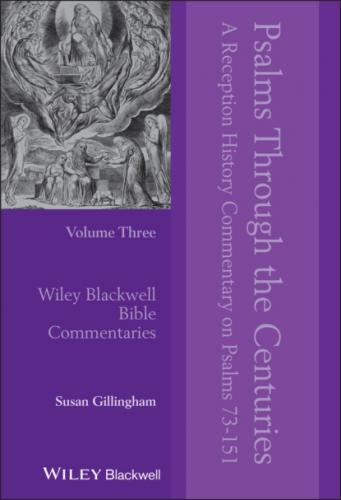Abbreviations of Greek and Latin Works
| Justin Martyr | 1 Apol. | First Apology |
| Dial. | Dialogue with Trypho | |
| Augustine of Hippo | Enarrat. Ps. | Enarrationes in Psalmos/ Expositions on the Psalms |
| Civ. | The City of God | |
| Conf. | Confessions | |
| Origen | Sel. Ps. | Selection from the Psalms |
| Cassiodorus | Exp. Ps. | Expositio psalmorum/ Explanation of the Psalms |
| Theodoret | Com. Ps. | Commentary on the Psalms |
| Eusebius | Com. Ps. | Commentary on the Psalms |
| Basil | Hom. Ps. | Homilies on the Psalms |
| Jerome | Tract. Ps. | Tractus in Psalmos |
| Ambrose | Exp in Ps | Explanations of Psalms |
| Athanasius | Interp. Ps. | Interpretation of the Psalms |
Abbreviations of Talmudic and Mishnaic Works
| Avot. | Pirkei Avot |
| Ber. | b.Berakhot |
| Sop. | Sopherim |
| Ros Has. | b.Rosh HaShanah |
| Sanh. | b.Sanhedrin |
BOOK THREE: PSALMS 73–89 Remembering, Human and Divine
Book Three is a selection of seventeen psalms, mainly communal in tone, whose shared themes include the destruction of the temple, the dispersion of the people and the humiliation of the king. Two early crises seem to have given rise to the composition and preservation of these psalms: the defeat of the northern kingdom by Assyria (722–21 BCE), and the defeat of the southern kingdom of Judah by Babylon (597–96 and 587–86 BCE). As for their reception history, most of these psalms have been interpreted further in the light of other later crises, such as the desecration of the Temple under Antiochus Epiphanes in c. 167 BCE, the fall of Jerusalem under Titus in 70 CE, the fall of Rome in 410 CE, the fate of Jerusalem during the Crusades in 1099 CE and 1187 CE, and, later, the fate of Constantinople in 1204 CE and 1453 CE. The earliest Assyrian and Babylonian crises nevertheless left an indelible mark on these psalms: often these two invasions merge together, sometimes reflecting in part a northern Israelite experience,1 and sometimes in part a southern Judean one.2 The theme of exile dominates this entire collection—a theme which is developed further in the seventeen psalms of Book Four. But whereas some answers are offered in Book Four, here in Book Three, the questions about theodicy, almost always from the point of view of the entire people, are more prominent.3 Here the psalmists wrestle with the problems of injustice, both human and divine, alongside the importance (and problem) of memory in recalling the past, asking whether God has forgotten them because they had forgotten God.4
Again the process of compilation constitutes the first stage of reception. In this case, the compilers seem to have arranged Book Three as a series of questions. ‘Has God forgotten to be gracious?’, and ‘How Long, O Lord?’, and ‘Will you be angry for ever?’ emerge frequently in these psalms (see for example 77:7–9; 79:5; 80:4; 82:2; 89:46), and whenever a partial answer is given, it is overtaken by further questions in a following psalm. Two main collections are discernible here seen in the headings ‘A Psalm of Asaph’ (73–83) and ‘A Psalm of the Sons of Korah’ (84, 85 and 87). Those with less clear headings (86, 88 and 89) may have other *Korahite associations; this would explain why they have been included into these collections. The *Asaphite collection has two sub-groups of five psalms (73–77 and 79–83), with Psalm 78, a more didactic psalm, playing a pivotal role at the heart of the whole collection, reflecting on the importance of remembering God’s covenant, first with Moses and then with David. The Korahite collection comprises six psalms (counting in Psalms 86, 88 and 89 here). Psalm 89, at the very end of
